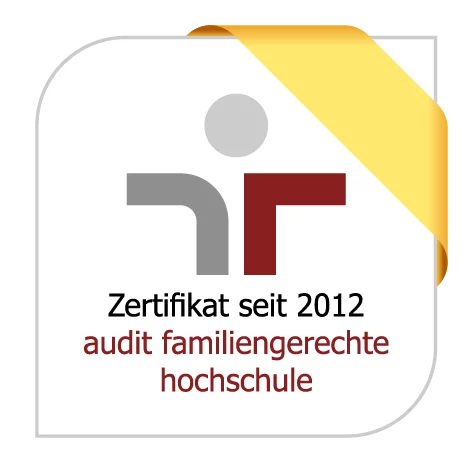
Prof. Dr. rer. nat.
Kirsten Wüst
Statistik und Wirtschaftsmathematik
Contact
Room
W2.3.25
Colloquium
MI 13.45 - 15.00 Uhr , Raum W2.3.25, Terminvereinbarung per Email
Phone
(07231) 28-6357Kirsten Wüst is Professor of Statistics and Business Mathematics at Pforzheim University. She has completed her studies of mathematics at the University of Stuttgart in 1998 with a doctorate in statistics. From 1998 to 2002, she worked as a consultant in risk controlling at L-Bank in Karlsruhe. From 2002 to 2004, she worked as a research assistant at the University of Heidelberg on the planning and evaluation of clinical studies. Since the winter semester 2004/2005, Kirsten Wüst has been teaching statistics and business mathematics as a professor at Pforzheim University.
Together with Hanno Beck, Kirsten Wüst conducts empirical research in the field of Behavioral Economics, which attempts to explain a number of behavioral anomalies descriptively, i. e. based on the observed behavior of people. People tend to behave inconsistently over time. If a decision between two alternatives that are effective at different times lies far in the future, they are more patient than if the decision is pending at the current time. The authors investigated the effect of time inconsistency in combination with the size effect. Time inconsistent behavior decreases with the size effect. Surprisingly, the decision is made intuitively even for large amounts, but in the opposite direction than for small amounts.
Further research deals with the phenomenon of overconfidence. Students tend to be overconfident about their future performance in university exams, which can lead to demotivation in case of unexpectedly bad results. In a longitudinal study with 441 students, students on average did not overestimate themselves in intelligence test questions. However, an over- or underestimation in intelligence test questions predicted a misjudgement in the mathematics and statistics exams of the study. Various strategies that could help to reduce self-overestimation in higher education were discussed.
To explain the conditional factors for current satisfaction and future prospects for young people who were seventeen years old between 2006 and 2013, a structural equation model was estimated using the representative SOEP panel (DIW Berlin). The young people surveyed indicated a high level of satisfaction overall and assessed their future career prospects as relatively good. Strong effects of personality on the young people‘s feeling of control over their lives and, thus, on their satisfaction and future expectations could be identified.
The career aspirations of students are an important topic for various interest groups: university administrators, career advisors, decision-makers in the university sector, and human resource managers in companies. Students whose career aspirations and goals are met, are better and more motivated employees. Together with Mirna Leko Simic of the University of Osijek, Kirsten Wüst used a questionnaire survey to compare the career aspirations and attitudes of 478 German and Croatian students. The significant differences identified between German and Croatian students were related to differences in the socioeconomic environment and cultural differences that could be derived from the Hofstede model.
Gender equality is a topic of growing importance. For this reason, Kirsten Wüst, together with Véronique Goehlich and Sabine Palm, conducted a survey in January 2012 with a sample of 193 economics students from China, France, Germany, Mexico, Russia, and Turkey. The focus of the study was to examine the influence of nationality and gender on students‘ career expectations.
Gender Pay Gap , Management Games , Seasonal Strategies , Time Inconsistency , India
2017
Lehrpreis der Fakultät für Wirtschaft und Recht
2009
Forschungspreis der Hochschule Pforzheim/ Kategorie ProfessorInnen
Journal article
WÜST, K., BREMSER, K. (2025). Artificial Intelligence in Tourism Through Chatbot Support in the Booking Process—An Experimental Investigation. Tourism and Hospitality, 6 (1), 36. doi:10.3390/tourhosp6010036.
BACHER, U., WÜST, K. (2025). Frankreich und Deutschland im Wettbewerb ihrer Aktienmärkte. Eine Rendite-Risikoanalyse seit 1988. Zeitschrift für das gesamte Kreditwesen, 4, 38-42.
CROWLEY-CYR, L., GERSHWIN, L.-A., BREMSER, K., ABRAHAM, V., MORENO MARTIN, M., CARRENO, M., WUEST, K. (2022). Jellyfish risk communications: The effect on risk perception, travel intentions and behaviour, and beach tourism destinations. Journal of Hospitality and Tourism Management, 51, 196-206. doi:10.1016/j.jhtm.2022.03.002.
BREMSER, K., WUEST, K. (2021). Money or love - Why do people share properties on Airbnb? Journal of Hospitality and Tourism Management, 48 (September), 23-31. doi:10.1016/j.jhtm.2021.05.009.
BACHER, U., WUEST, K. (2021). Deutschland gegen Holland. Untersuchung von Rendite und Risiko anhand zweier Aktienmärkte. Zeitschrift für das gesamte Kreditwesen, 2021 (13), 19-23.
SCHMITZ, A., WUEST, K., FRITZ, L. (2021). Influence of New Work Attributes in Job Advertisements on Perceived Organizational Attractiveness. mrev management revue, 32 (4), 318 - 342. doi:doi.org/10.5771/0935-9915-2021-4-318.
KAMPE, L., GOEHLICH, V., WUEST, K. (2021). The Impact of Culture on the Perception of Young Japanese and Germans in the Management of the Corona Crisis by their Government. Public Organization Review. doi:10.1007/s11115-021-00592-8.
WUEST, K., BECK, H. (2019). Altruismus, Fairness und Reziprozität. WISU Das Wirtschaftsstudium, 2/19, 222-227.
WUEST, K., BECK, H. (2018). “I Thought I Did Much Better”—Overconfidence in University Exams. Decision Journal of Innovative Education, 16 (4), pp. 310-333.
BECK, H., WUEST, K. (2017). Behavioral Economics: Überoptimismus. WISU Das Wirtschaftsstudium (5), 605-609.
WUEST, K., LEKO SIMIC, M. (2017). Students' career preferences: Intercultural study of Croatian and German students. Economics and sociology, 10 (3), pp. 136-152.
WUEST, K. (2016). Ich bin glücklicher, wenn Ihr mir helft, selbst Entscheidungen zu treffen - Zufriedenheit und Zukunftserwartungen von Siebzehnjährigen (2006-2013). Zeitschrift fur Familienforschung, 1/2016, 87-111.
BECK, H., WUEST, K. (2016). Ich kann warten – aber nur, wenn es sich lohnt.. Zeitinkonsistenz und Größeneffekt. Wirtschaftspsychologie, 1 (1), 91 - 103.
WUEST, K. (2016). Monte-Carlo-Simulation. WISU Das Wirtschaftsstudium, 12/16, 1346-1351.
GOEHLICH, V., WUEST, K., PALM, S. (2015). Gender Egalitarianism and Career Expectations: Comparing China, France, Germany, Mexico, Russia, and Turkey. The International Journal of Organizational Diversity, 15 (2), pp. 1-12.
WUEST, K. (2015). INTERESTING TASKS, INDEPENDENCE OR IMPORTANCE TO SOCIETY? - THE VOCATIONAL EXPECTATIONS OF GENERATION Y. Ekonomski Vjesnik / Econviews : Review of Contemporary Entrepreneurship, Business, and Economic Issues, 2/2015 (XXVIII), 307-324.
WÜST, K., KUPPINGER, B. (2014). Ich bin dann mal - nicht weg - Erfahrungen mit einem stetigen Planspiel. WiSt Wirtschaftswissenschaftliches Studium, 43. Jg. (5), 279-283.
BACHER, U., WÜST, K. (2012). Saisonalitätseffekte im deutschen Rentenindex REXP – zur Rendite und zu den Risiken deutscher Bundesanleihen (grundsätzliche Überlegungen und empirische Untersuchung). Zeitschrift für das Gesamte Kreditwesen - Ausgabe N (15), 764-767.
WÜST, K., VOLKERT, J. (2012). Childhood and Capability Deprivation in Germany: A Quantitative Analysis Using German Socio-Economic Panel Data. SOCIAL INDICATORS RESEARCH, 106 Jg. (3), 439-469.
WÜST, K., BURKART, B. (2012). Schlecht gepokert? Warum schneiden Frauen bei Gehaltsverhandlungen schlechter ab als Männer? Gender : Zeitschrift für Geschlecht, Kultur und Gesellschaft, 106-121.
WÜST, K., BECK, H. (2012). Behavioral-Finance-Konzepte. WiSt Wirtschaftswissenschaftliches Studium, 41. Jg. (7), 936-941.
WÜST, K., BECK, H. (2012). Student effort in preparing for exams: Intertemporal preferences and loss aversion. Decision Sciences Journal of Innovative Education, 10 (2), 245-262.
KUPPINGER, B., WÜST, K. (2012). Is everything just a game? From the discrete to the continuous time modeling of corporate strategy games. Journal of management control : Zeitschrift für Planung & Unternehmenssteuerung, 23 (3), 211-228.
KUPPINGER, B., WÜST, K. (2011). Just a game? How continuous time modelling can ameliorate corporate strategy games. World Review of Entrepreneurship Management and Sustainable Development, 7 (4), 422-439.
KUPPINGER, B., WÜST, K. (2011). Simulation von Auftrags- und Lagerfertigung. WiSt Wirtschaftswissenschaftliches Studium, 40. Jg. (10), 1344-1348.
WÜST, K., BURKART, B. (2011). Karrierecockpit für Frauen - Männer im Ferrari – Frauen mit dem Bobbycar: Der Start in die Karriere ist ein höchst ungleicher. Personal (2), 40-42.
WÜST, K., BURKART, B. (2010). Womit haben wir das verdient? - Weniger Geld bei besserer Leistung. Wirtschafts- und Sozialwissenschaftliches Institut Mitteilungen (6), 306-313.
BECK, H., WÜST, K. (2010). Rauchen, Sucht und Willensschwäche: Zeitinkonsistentes Verhalten.. WiSt Wirtschaftswissenschaftliches Studium (6), 289-294.
CLEFF, T., WÜST, K. (2010). Algorithm for an Efficient Material Requirements Planning of Consumable Supplies Results of an Empirical Analysis of German Supply Data. Jordan Journal of Business Administration, 6 (4), 581-598.
BECK, H., WÜST, K. (2009). Ökonomische Theorie der Zeit und Psychologie. List-Forum, 35 (1), 43-60.
WÜST, K., BACHER, U. (2008). Saisonalitätseffekte im deutschen Aktienindex DAX - Rendite und Risiko deutscher Standardaktien im Jahresverlauf - grundsätzliche Überlegungen und empirische Untersuchung. Finanz Betrieb (11), 748-759.
WÜST, K., WINKLMAIER, U., PLINKERT, P. K., WALLNER, F. (2007). The accuracy of the modified Evans blue dye test in detecting aspiration in head and neck cancer patients. EUROPEAN ARCHIVES OF OTO-RHINO- LARYNGOLOGY, 264 (9), 1059-1064.
WÜST, K., WINKLMAIER, U., WALLNER, F. (2007). Experimentelle Untersuchung zum Dichtheitsverhalten geblockter Trachealkanülen. Forum Logopädie (2), 26-31.
WÜST, K., WINKLMAIER, U., SCHILLER, S., WALLNER, F. (2006). Leakage of Fluid in Different Types of Tracheal Tubes. DYSPHAGIA, 21 (4), 237-242.
WÜST, K., HELMKE, B., HASSANZADEH, J., THOME, M. (2006). The oncogenic B-raf V599E mutation occurs more frequently in melanomas at sun-protected body sites. INTERNATIONAL JOURNAL OF ONCOLOGY, 29 (1), 139-145.
WÜST, K. (2005). Including long- and short-term data in blinded sample size recalculation for binary endpoints. COMPUTATIONAL STATISTICS & DATA ANALYSIS, 48, 835-855.
WÜST, K., KIESER, M. (2005). Monitoring Continuous Long-Term Outcomes in Adaptive Designs. COMMUNICATIONS IN STATISTICS- SIMULATION AND COMPUTATION, 34, 321-341.
WÜST, K., WINKLMAIER, U., WALLNER, F. (2005). Evaluation des Aspirationsschutzes blockbarer Trachealkanülen.. HNO, 53 (12), 1057-1062.
WÜST, K., DEICHMANN, M., KAHLE, B., MOSER, K. (2004). Diagnosing melanoma patients entering American Joint Committee on Cancer (AJCC) stage IV, C-reactive protein (CRP) in serum is superior to lactate dehydrogenase (LDH).., 91, pp. 699-702.
WÜST, K. (2004). Safety of the combination of chloroquine and methylene blue in healthy adult men with G6PD deficiency from rural Burkina Faso. Tropical Medicine and International Health.
WÜST, K., KIESER, M. (2003). Blinded Sample Size Recalculation for Normally Distributed Outcomes Using Long- and Short-term Data.. BIOMETRICAL JOURNAL, 45, 915-930.
Book/Monograph/Ebook
WÜST, K. (2014). Risikomanagement - Eine Einführung mit Anwendungen in Excel (1. Auflage ed.). UVK Verlagsgesellschaft.
WÜST, K. (2006). Finanzmathematik - Vom klassischen Sparbuch zum modernen Zinsderivat (1. Auflage ed.). Wiesbaden: Gabler Verlag.
Chapter in Book
WÜST, K. (2012). Optimierung von Losgröße, Durchlaufzeit und Werkstattumlaufbeständen. In Klein, Andreas/ Schnell, Harald (Eds.), Der Controlling-Berater, Controlling-Instrumente in der Produktion. Haufe-Gruppe.
VOLKERT, J., WÜST, K. (2011). Early Childhood, Agency and Capability Deprivation - A Quantitative Analysis Using German Socio-Economic Panel Data. In Ortrud Leßmann, Hans-Uwe Otto und Holger Ziegler (Eds.), Closing the Capabilities Gap. Renegotiating social justice for the young (1. Auflage ed.). Barbara Budrich Publishers.
CLEFF, T., WUEST, K. (2008). Ansätze einer algorithmischen Anwendung quantitativer Verfahren zur effizienten Bedarfsprognose von Vorprodukten. Erste Ergebnisse einer empirischen Untersuchung. In Barkovic, D., Runzheimer, B. (Eds.), New Approaches to Research in Management. Grafika.
Article in Proceedings
GOEHLICH, V., WUEST, K. (2015). Gender role perceptions among female students of economics from China, Germany, Mexico, Russia and Turkey. Innovation, Entrepreneurship and Sustainable Value Chain in a Dynamic Environment, 8th Annual Conference of the EuroMed Academy of Business (pp. 900-915).
VOLKERT, J., WÜST, K. (2010). Childhood and Capability Deprivation in Germany. A quantitative analysis using German socio-economic panel data. Paper presented at the 10th Human Development and Capability Association Conference, 21. - 23. September 2010.
VOLKERT, J., WÜST, K. (2009). Early Childhood, Agency, and Capability Deprivation. A quantitative analysis using German socio-economic panel data. Paper präsentiert auf der Jahreskonferenz der Human Development and Capability Association (HDCA), 10 - 12. September 2009.
Academic Papers of Pforzheim University
BECK, H., WÜST, K. (2009). Gescheiterte Diäten, Wucherzinsen und Warteprämien: Die neue ökonomische Theorie der Zeit. Pforzheim, Germany.
Presentation at a Conference
2015
Osijek-Symposium
Germany
Member of the organizing committee of a professional event
since 2015
Organisation "Lange Nacht der Wissenschaft"
Germany
Research Semester/Sabbatical
2015
Forschungssemester
Germany
Program Director
since 2013
Fachgebietsleiterin Quantitative Methoden
Germany



